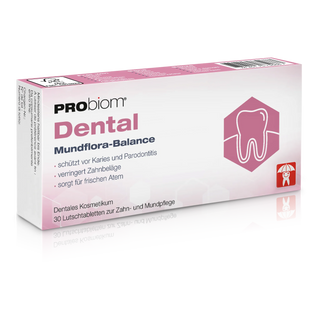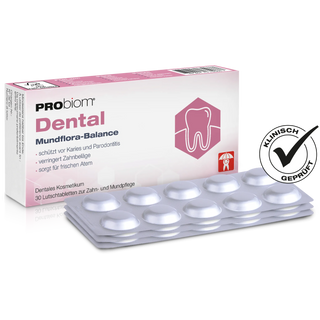Bad breath is a widespread problem that many people are reluctant to talk about. Halitosis, the medical term for bad breath, can significantly impair self-confidence and lead to insecurity in everyday life. Those affected often resort to quick fixes like chewing gum, mints, or mouth sprays, which only mask the symptom without addressing the cause.
In an interview with Stiftung Warentest, Prof. Stefan Zimmer, a dentist at the University of Witten/Herdecke, explains in detail how bad breath develops, the role bacteria play, and which scientifically proven methods actually help. In addition, the meta-analysis in BMJ Open provides valuable insights into the targeted use of probiotics, particularly the Streptococcus salivarius M18 strain, which both positively influences the oral flora and reduces the formation of unpleasant odors.
The causes of bad breath
First, it's important to distinguish between normal and abnormal bad breath. Everyone is familiar with "morning breath," which is caused by reduced saliva flow during the night. Saliva is normally responsible for flushing bacteria and food debris from the oral cavity. At night, this mechanism is impaired, which promotes the proliferation of odor-causing bacteria. Certain foods such as garlic, onions, coffee, or alcohol can also temporarily cause bad breath. This usually disappears after a while or with thorough oral hygiene.
Bad breath is caused by anaerobic bacteria, which are found primarily on the back of the tongue, between teeth, or in gum pockets. They break down sulfur-containing amino acids, producing volatile sulfur compounds that cause the unpleasant odor. Stiftung Warentest emphasizes that around 80 percent of all cases of halitosis begin in the oral cavity, while only about 20 percent are due to other causes such as nasal or throat infections, digestive problems, or systemic diseases.
Probiotics: Scientifically proven helpers against bad breath
A key finding of the interview with Stiftung Warentest is the role of probiotics. These live microorganisms can help control odor-causing bacteria in the mouth. Among those scientifically studied were Lactobacillus salivarius , L. reuteri , L. acidophilus , Streptococcus salivarius , and Weissella cibaria . Weissella cibaria, in particular, was shown in laboratory tests to reduce the formation of volatile sulfur compounds.
However, in the Stiftung Warentest article , Prof. Zimmer emphasizes that probiotics are not a substitute for therapy. They should be used in addition to proven measures such as thorough oral hygiene and professional teeth cleaning. The dosage form is crucial: Lozenges, chewing gum, or mouthwashes work directly in the mouth, allowing the bacteria to come into contact with the tongue and gums, where the odor-causing bacteria live.
Evidence from research: BMJ Open and Streptococcus salivarius M18
The meta-analysis published in BMJ Open reviewed more than 200 studies on the effects of probiotics on bad breath. After quality control, seven studies with a total of 278 participants were evaluated. The results showed that taking probiotics for approximately four weeks reduced both subjectively perceived bad breath and objectively measurable levels of volatile sulfur compounds.
The Streptococcus salivarius strain, especially the K12 and M18 variants, deserves special attention. These bacteria have been shown to inhibit the production of odor-causing substances and can also improve oral health. A study with young adults who took a probiotic containing M18 for four weeks showed significant improvements in the gingivitis index and plaque index. This demonstrates that the positive effects extend beyond odor to improve inflammatory processes in the mouth and overall oral hygiene.
Despite these successes, the effectiveness of probiotics varies from individual to individual. Short-term effects are well documented, but long-term studies spanning several months or years are still rare. Stiftung Warentest therefore recommends considering probiotics as a complementary measure while simultaneously observing proven hygiene measures.
Proven measures against bad breath
The foundation of any treatment for bad breath is consistent oral hygiene. This includes regular brushing, interdental cleaning, and cleaning the back of the tongue. The back of the tongue, in particular, is often the main source of odor-causing bacteria. In the Stiftung Warentest article, Prof. Zimmer recommends tongue cleaners or special brushes to effectively remove plaque. Antibacterial mouthwashes can be helpful, but they are never a substitute for mechanical cleaning.
Regular professional dental cleanings at the dentist are another key step. They remove tartar, plaque, and bacteria that contribute to bad breath. In cases of persistent or chronic bad breath, possible causes outside the oral cavity should be investigated, such as infections in the nasopharynx, gastrointestinal problems, or systemic diseases such as diabetes or kidney or liver dysfunction.
The role of nutrition
Dietary habits can have a significant impact on breath. Garlic, onions, coffee, alcohol, and certain spices can temporarily cause bad breath. Scientific evidence suggests that probiotic foods like yogurt can positively influence the oral flora. However, to date, no clinical studies have shown that yogurt alone significantly reduces bad breath. The combination with targeted probiotic use and careful oral hygiene is crucial.
Practical application of probiotics
Anyone who wants to effectively combat bad breath should use probiotics in addition to basic oral care measures. Products containing Streptococcus salivarius M18 or K12 are particularly interesting because they both reduce bad breath and improve oral health. They are used for four weeks or longer, depending on the product. Observations such as the effect on bad breath and oral health should be documented to assess effectiveness.
Probiotics work best when taken regularly and basic hygiene practices are followed. Products should contain tested strains and act directly in the mouth, such as lozenges, chewing gum, or mouthwash. Combining them with other strains can also be beneficial in some cases, but the effects should be monitored individually.
Summary
Bad breath is usually caused by bacterial activity in the mouth. It is best treated with consistent oral hygiene, regular professional dental cleanings, and, if necessary, the targeted use of probiotics. The findings from Stiftung Warentest and the meta-analysis in BMJ Open show that probiotics such as Streptococcus salivarius M18 can reduce both subjectively perceived bad breath and objectively measurable sulfur compounds.
It's important to note that probiotics are not a miracle cure and their effects vary from individual to individual. They should be viewed as a complement to proven hygiene measures. Long-term research will be needed to provide even more precise recommendations, particularly regarding dosage, duration, and combination of different strains.
With these findings, those affected can take targeted, scientifically sound action instead of relying on short-term solutions. The combination of basic oral care and targeted probiotic use offers the best chance of sustainably reducing bad breath, improving oral health, and boosting self-confidence.












